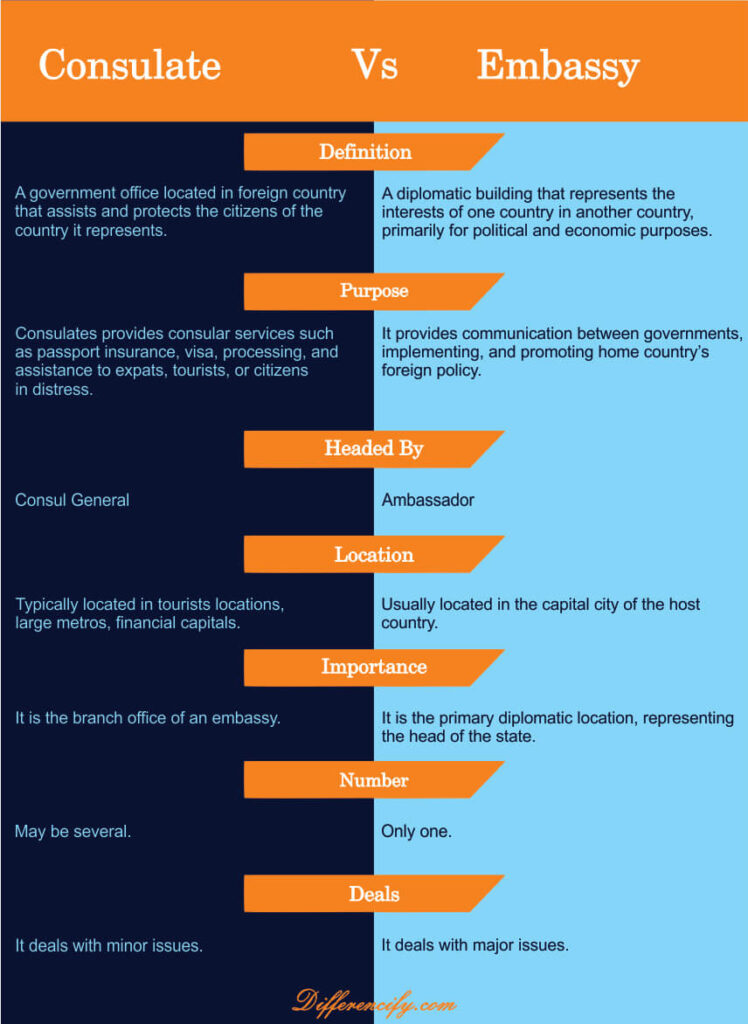Diplomatic relations between countries are of utmost importance in maintaining peace and stability around the world. To facilitate this communication, countries establish diplomatic missions such as consulates and embassies. These two terms are often used interchangeably, leading to confusion as to their meaning. In this article, we will take a closer look at the difference between consulate and embassy with the help of a table and different key points.
Consulate Vs Embassy
| Consulate | Embassy |
|---|---|
| A consulate is a government office located in a foreign country that assists and protects the citizens of the country it represents. | A diplomatic building that represents the interests of one country in another country, primarily for political and economic purposes is known as an embassy. |
| The purpose of the consulate is to provide consular services such as passport issuance, visa processing, and assistance to citizens in distress. | The purpose of an embassy is to handle political and diplomatic relations between two countries, including the protection of citizens and their interests abroad, as well as promoting economic, commercial, and cultural relations. |
| It is headed by the consul general. | It is headed by Ambassador. |
| Consulate is the branch office of an embassy. | It is the primary diplomatic location, representing the head of the state. |
| There can be several numbers of consulates in a country. | There can only be one embassy in a country. |
| It deals with minor issues. | It deals with major issues. |
| A consulate also represents the interests of the country it serves in the host country. | An embassy represents the interests of the country it serves in the host country and abroad. |
| It is typically located in tourist locations, large metros, and financial capitals. | It is usually located in the capital city of the host country. |
You Can Also Read:
What is a Diplomatic Relationship?
A diplomatic mission refers to a representative office set up by one country in another country in order to promote friendly relations between the two countries and facilitate communication. These missions can be of various types, including consulates, embassies, and permanent missions.
What is a Consulate?
A consulate is a type of diplomatic mission that primarily focuses on providing assistance and protection to its citizens living or traveling in the host country. The consular section of a consulate is responsible for providing services such as visa issuance, birth registration, legal assistance, and other services related to the welfare of its citizens abroad. Consulates do not have the same level of authority as embassies, and their services are typically limited to their citizens. In a nutshell, we can say that a consulate is actually the arm or a branch of an embassy.
What is an Embassy?
An embassy is the main diplomatic mission of a country in another country. Embassies are headed by an ambassador who serves as the official representative of the sending country. The main function of an embassy is to represent the interests of its home country in the host country and to negotiate and maintain political, economic, and cultural relations between the two countries. In addition to consular services, embassies also provide other services such as political and economic analysis, cultural promotion, and support for trade and investment. In a nutshell, it is the main or parent branch of a consulate.
Key Differences Between Consulate and Embassy
While comparing the consulate vs embassy, here we have included some of the key differences between them.
- Purpose: The main difference between a consulate and an embassy is their purpose. Consulates are focused on providing assistance and protection to citizens. On the other hand, embassies are focused on promoting and maintaining the political, economic, and cultural relations between two countries.
- Authority: Embassies have more authority and responsibility compared to consulates. Embassies are responsible for negotiating and maintaining relations between the two countries, while consulates are primarily responsible for providing assistance and protection to citizens.
- Services: Consulates generally provide limited services compared to embassies. Consulates provide consular services such as visa issuance and birth registration. On the other hand, embassies provide a wider range of services such as political analysis, cultural promotion, and support for trade and investment.
- Representation: An ambassador heads an embassy and is considered to be the official representative of the sending country. On the other hand, consulates are headed by consuls who are considered to be representatives of their home country in a limited capacity.
The following chart compares both consulate vs embassy in a brief way.

The Importance and Purposes of a Diplomatic Mission
Some of the important functions due to which a diplomatic mission is important are as follows.
- Promoting International Relations: Diplomatic missions serve as a key conduit for promoting and maintaining positive relations between countries. By facilitating communication and cooperation, diplomatic missions help to build bridges between nations and create a more peaceful and stable world.
- Protecting Citizen Interests: Diplomatic missions play an important role in protecting the interests and welfare of the citizens of the sending country. Consulates, in particular, provide vital services such as visa issuance, birth registration, and legal assistance to citizens abroad.
- Negotiating Treaties and Agreements: Embassies serve as the primary negotiating body between countries, working to establish treaties and agreements that promote peace and stability.
- Facilitating Trade and Investment: Diplomatic missions play a crucial role in promoting trade and investment between countries. Embassies, for example, may provide support for business development and investment opportunities, helping to foster a healthy and thriving global economy.
- Promoting Cultural Exchange: Diplomatic missions serve as a platform for promoting cultural exchange and understanding. Through cultural events and exchange programs, they help to break down cultural barriers and foster greater understanding between nations.
- Providing Political and Economic Analysis: Embassies play an important role in providing political and economic analysis to the sending country. By keeping a close eye on political and economic developments in the host country, they help to inform the sending country’s foreign policy decisions.
Conclusion
So to wrap up this article, we can say that consulates and embassies are two different but important pieces in the puzzle of international diplomacy. While consulates serve to help and protect citizens of their home country abroad, embassies work to maintain strong political, economic, and cultural relationships between nations.
Or we can say that, as a consular agent, your consulate will offer assistance and protection to its citizens in need. And as an embassy agent, your embassy will help to promote and maintain political, economic, and cultural relations between the two countries. So, Understanding the differences between consulates and embassies can help us appreciate the important role these diplomatic missions play in promoting peace and stability around the world.




2 Comments